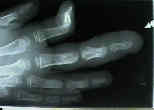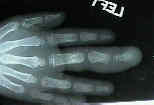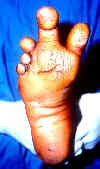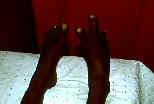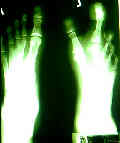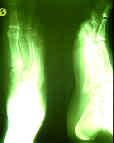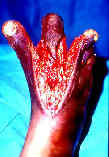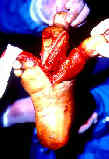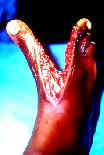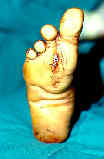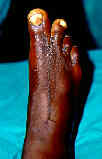- Discussion:
- a hamartomatous enlargement of soft tissue & underlying bone;
- can be static, growing commensurately w/ hand, or progressive, growing faster than the rest of the hand;
- involvement in the hand is more common than involvement in the foot;
- "nerve territory-oriented macrodactyly":
- some authors believe that digital nerves cause disproportionate growth of the finger (and that excision in children will reduce
growth with minimal neurologic sequelae;
- enlargement of the nerve supply to affected digits that more commonly follow the distribution of the median nerve than that of ulnar nerve;
- associated conditions:
- neurofibromatosis: as fat & fibrous tissue are found in peripheral nerves of both dz's;
- lipofibromatosis
- references:
- Lipofibroma of the median nerve in the palm and digits of the hand.
- Lipofibromatous hamartomas of the median nerve.
- Lipofibromatous hamartoma of nerve.
- hemi-hypertrophy;
- Wilm's tumor, adrenal carcinoma, and hepatoblastoma: the association of hemihypertrophy w/ intra-abdominal tumors is particularly
strong with Beckwith-Wiedemann syndrome;
- macrodactyly simplex congenita:
- 10% of cases;
- enlargement includes skin, subQ tissue, nerve, joint, and bone (tendons and blood vessels are of normal size);
- most often phalanges are involved and metacarpals are spared;
- macromelia;
- proteus syndrome;
- diff dx:
- AV malformation
- congenital lymphangioma;
- macrodystophia lypomatosa progressive:
- rare form of localized gigantism characterized by a congenital and progressive overgrowth of all the mesenchymal elements in
digit, with a disproportionate increase in the fibroadipose tissue
- Treatment:
- staged debulking, dealing with one side of digit or hand at a time, because blood supply to the skin of the enlarged digits is poor;
- in the first stage, defatting is performed on one side of digit, removing up to 20% of its thickness (convex side of digit is adressed first);
- in the second stage, perform similar defatting procedure and consider bone shortening;
- in severe cases, consider removal of an entire phalanx (digit must be stabilized with a K wire, extensor tendon shortened, and flexor tendon left alone);
- appropriately timed epiphysiodesis of the involved bones is performed during growth;
- alternatively, later bone resections and fusions can be carried out;
- thumb reduction has been performed by excising the central third and attaching the two lateral portions of bone side to side;
- in the report by Bertelli JA, et al., the author used a hemi-Bruner zigzag incision was made on the palmar and dorsal aspects of
the ulnar sides of the digit, with incisions aligned to match the zigzags;
- an en bloc dissection included skin, fatty tissue, neurovascular bunldes, and longitudinal resection of 1/3 of the articular surfaces and
bone (proximal, middle, and distal phalanges);
- tip of the finger and part of the nail were also removed, which allowed digit shortening;
- collateral ligament of the proximal IP joint was harvested from the portion of the digit removed;
- transverse shortening was additionally achieved by resection of the physis of the distal phalanx and the DIP joint;
- transverse retinacular ligament of the extensor tendon was sutured to the flexor tendon sheath;
- 6 months later, the patient underwent debulking of the skin on the opposite side (w/ preversation of the NV bundle);
- Case Example: by Jan Van Der Bauwhede MD


